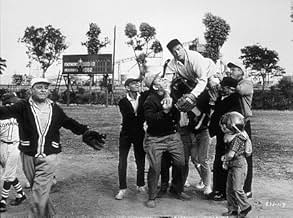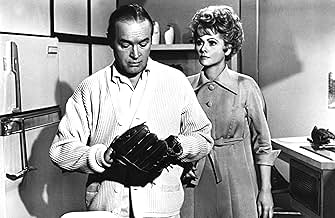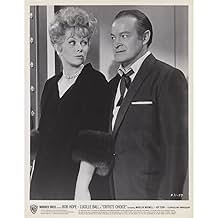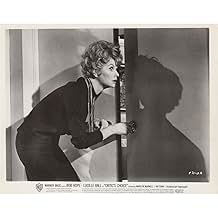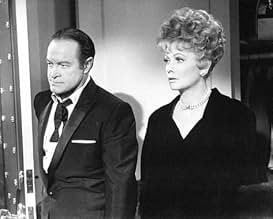CALIFICACIÓN DE IMDb
5.7/10
1.2 k
TU CALIFICACIÓN
Parker Ballantine es crítico teatral de Nueva York y su esposa escribe una obra que puede o no ser muy buena. Ahora Parker debe dejar de criticar la obra o provocar la ruptura de su matrimon... Leer todoParker Ballantine es crítico teatral de Nueva York y su esposa escribe una obra que puede o no ser muy buena. Ahora Parker debe dejar de criticar la obra o provocar la ruptura de su matrimonio.Parker Ballantine es crítico teatral de Nueva York y su esposa escribe una obra que puede o no ser muy buena. Ahora Parker debe dejar de criticar la obra o provocar la ruptura de su matrimonio.
- Dirección
- Guionistas
- Elenco
Rickey Kelman
- John Ballantine
- (as Ricky Kelman)
Joseph Gallison
- Philip 'Phil' Yardley
- (as Evan McCord)
- Dirección
- Guionistas
- Todo el elenco y el equipo
- Producción, taquilla y más en IMDbPro
Opiniones destacadas
New York theater critic Parker Ballantine (Bob Hope) is married to wannabe playwright Angela (Lucille Ball). They live with his son John from his previous marriage to flighty actress Ivy London (Marilyn Maxwell). Angie is writing a play about her family and he's rather dismissive. According to him, she doesn't finish anything. She actually finishes and Dion Kapakos (Rip Torn) is directing it.
It's interesting that his second wife is more age appropriate than the first wife. I would expect it to be the opposite. A switch would make them fit the stereotypes, but it would also deprive the movie of the Hope Ball pairing. I'll take the pairing over the stereotyping. Their stardoms have faded from their pinnacles, but they still have plenty of star power. As a comedy, this is lacking especially considering the two legends involved. It's more a drama than a comedy. At least, it's better as a drama than a comedy. Bob Hope does his comedic mugging and it's not that funny. There is potential with the marital conflict. It works, but I would like more from Ball. This is very much his movie instead of their movie. This was sold as a comedy. It tries to be a comedy. They should have concentrated more on the drama.
It's interesting that his second wife is more age appropriate than the first wife. I would expect it to be the opposite. A switch would make them fit the stereotypes, but it would also deprive the movie of the Hope Ball pairing. I'll take the pairing over the stereotyping. Their stardoms have faded from their pinnacles, but they still have plenty of star power. As a comedy, this is lacking especially considering the two legends involved. It's more a drama than a comedy. At least, it's better as a drama than a comedy. Bob Hope does his comedic mugging and it's not that funny. There is potential with the marital conflict. It works, but I would like more from Ball. This is very much his movie instead of their movie. This was sold as a comedy. It tries to be a comedy. They should have concentrated more on the drama.
Bland comedy/drama about nasty theater critic Bob Hope, who's only happy when he's trashing the latest Broadway sensation, has to contend with his wife, Lucille Ball, deciding she wants to become a playwright. Will Bob write a nasty review of his wife's play? Will Bob write a gushing review? I'm not sure there's any real suspense what actually happens, but the only reason to watch this film is for Hope and Ball, who are good, but the jokes are sadly not all that funny. It also doesn't help that the film lacks the rapid pace of Hope's better comedies. Overall, "Critic's Choice" features two brilliant comedians in a less than brilliant comedy. FUN FACT: This film was based on a play by Ira Levin, who's best known as the author of "Rosemary's Baby" and "The Stepford Wives."
BOB HOPE and LUCILLE BALL do okay in this mild comedy about a woman (Lucy) who decides to show her theater critic hubby (Hope) that she can create a play based on her family relatives.
RIP TORN is amusing as the director of Lucy's play, working on it night and day to put it into shape while Hope seethes with jealousy. Meanwhile, his ex-wife, MARILYN MAXWELL, is around often enough to keep Lucy irate enough.
The friction between theater critic and playwright comes to life whenever they trade barbs. The comedy aspects fall flat once in awhile with the more serious moments given more emphasis than usual in a Bob Hope/Lucille Ball comedy.
JESSIE ROYCE LANDIS does nicely as Hope's mother. This isn't the typical fare expected of Hope or Ball, but it has its moments where the plot elements have more dimension than usual in a caper of this sort.
Hope has his usual one-liners.
"What are you trying to do--drown your troubles?" a bartender asks him.
"No, I'm just teaching them how to swim."
RIP TORN is amusing as the director of Lucy's play, working on it night and day to put it into shape while Hope seethes with jealousy. Meanwhile, his ex-wife, MARILYN MAXWELL, is around often enough to keep Lucy irate enough.
The friction between theater critic and playwright comes to life whenever they trade barbs. The comedy aspects fall flat once in awhile with the more serious moments given more emphasis than usual in a Bob Hope/Lucille Ball comedy.
JESSIE ROYCE LANDIS does nicely as Hope's mother. This isn't the typical fare expected of Hope or Ball, but it has its moments where the plot elements have more dimension than usual in a caper of this sort.
Hope has his usual one-liners.
"What are you trying to do--drown your troubles?" a bartender asks him.
"No, I'm just teaching them how to swim."
When you watch a film that starred two legends of comedy (Lucille Ball and Bob Hope) you expect to find a very funny movie. And, yes, "Critic's Choice" has some amusing parts to it. As a comedy, it's more "Bob Hope" style than "Lucille Ball" style. The humour is more subtle and ironic (more like Hope) than the kind of slapstick physical comedy that Ball was known for - although it does include some physical comedy, surprisingly given to Hope in the last half hour or so. But to call this movie a "comedy" I think is to miss the point. I saw it as more of a drama, even more a psychological study of Hope's character. He played Parker Ballantine, a fierce Broadway critic for a New York newspaper, while Ball plays his wife Angie, who gets it into her head to write a play about her early life with her mother and three sisters.
If I were to rate this as a comedy, I'd probably say that it fell flat - but I was actually quite taken with the story and the character of Parker. He was an unpleasant character. Yes, Hope played him with some comedy - but he wasn't a nice man. Once Angie decided to write her play (very early in the movie) Parker wouldn't let his critic's voice go. He discouraged her, he belittled her, he made fun of her - and most of it, while couched as a comedy, was actually rather mean and not funny. When the movie opened, Parker was writing a scathing review of a play that starred his ex-wife (who was played by Marilyn Maxwell.) That goes almost immediately into his acerbic attitude toward Angie's play. The point gets made in the movie that maybe Parker has a problem - he disses everything that the women who are close to him try to do, almost as if he's trying to sabotage them and their careers; as if he doesn't want a "successful" woman in his life. And, although there's an attempt to redeem him slightly at the end, Parker's most obnoxious scenes come late in the movie at the theatre, the night Angie's play opens in New York. Having withdrawn from reviewing the play, he shows up anyway - drunk and, frankly, obnoxious (I'm not sure why he wouldn't have been kicked out of the theatre, or even why he was allowed in in the first place) - tries to kick his paper's reviewer out and when he can't do that goes up to the balcony and causes quite a scene (this is where Hope's physical comedy comes in.) He then proceeds to write a review of the play anyway and his review is blistering, as he writes that the play "was written by Angela Ballantine, directed by Dion Kapakos, and produced by mistake." (I must admit that I wondered why his paper would allow a drunken reviewer - even a big name one - to write a review of a play written by his own wife to which someone else had been assigned as the reviewer, but maybe that's thinking too much about this.)
This was not what I was expecting. I was expecting a light comedy - instead I got more of a drama about a couple with some really serious issues in their marriage. And while I wouldn't rate it that highly as a comedy, I thought that if you look at it as a marital drama it's actually pretty good. For me, the most powerful scene in the movie didn't even involve Ball - it was the very dramatic and even acerbic confrontation between Parker and his son John (played by Ricky Kelman) - who seems to have irritated a few reviewers, but who I thought was actually pretty good, playing a kid who had obviously been raised in a somewhat strange environment. The scene was set at home on opening night, before Parker's drinking binge. That confrontation aside, John's relationship with his mother (Maxwell) was especially weird - she seems to have been largely uninterested in him, and he calls her not "Mom" but "Ivy."
There's a decent supporting cast - most of whose names (Rip Torn, Jim Backus, Richard Deacon and even Soupy Sales) add to the expectation that you're going to be watching a funny movie. But I would suggest not watching this to get a good laugh, even if that is your initial expectation. Watch it as more of a character study of Parker. It works much better that way. (7/10)
If I were to rate this as a comedy, I'd probably say that it fell flat - but I was actually quite taken with the story and the character of Parker. He was an unpleasant character. Yes, Hope played him with some comedy - but he wasn't a nice man. Once Angie decided to write her play (very early in the movie) Parker wouldn't let his critic's voice go. He discouraged her, he belittled her, he made fun of her - and most of it, while couched as a comedy, was actually rather mean and not funny. When the movie opened, Parker was writing a scathing review of a play that starred his ex-wife (who was played by Marilyn Maxwell.) That goes almost immediately into his acerbic attitude toward Angie's play. The point gets made in the movie that maybe Parker has a problem - he disses everything that the women who are close to him try to do, almost as if he's trying to sabotage them and their careers; as if he doesn't want a "successful" woman in his life. And, although there's an attempt to redeem him slightly at the end, Parker's most obnoxious scenes come late in the movie at the theatre, the night Angie's play opens in New York. Having withdrawn from reviewing the play, he shows up anyway - drunk and, frankly, obnoxious (I'm not sure why he wouldn't have been kicked out of the theatre, or even why he was allowed in in the first place) - tries to kick his paper's reviewer out and when he can't do that goes up to the balcony and causes quite a scene (this is where Hope's physical comedy comes in.) He then proceeds to write a review of the play anyway and his review is blistering, as he writes that the play "was written by Angela Ballantine, directed by Dion Kapakos, and produced by mistake." (I must admit that I wondered why his paper would allow a drunken reviewer - even a big name one - to write a review of a play written by his own wife to which someone else had been assigned as the reviewer, but maybe that's thinking too much about this.)
This was not what I was expecting. I was expecting a light comedy - instead I got more of a drama about a couple with some really serious issues in their marriage. And while I wouldn't rate it that highly as a comedy, I thought that if you look at it as a marital drama it's actually pretty good. For me, the most powerful scene in the movie didn't even involve Ball - it was the very dramatic and even acerbic confrontation between Parker and his son John (played by Ricky Kelman) - who seems to have irritated a few reviewers, but who I thought was actually pretty good, playing a kid who had obviously been raised in a somewhat strange environment. The scene was set at home on opening night, before Parker's drinking binge. That confrontation aside, John's relationship with his mother (Maxwell) was especially weird - she seems to have been largely uninterested in him, and he calls her not "Mom" but "Ivy."
There's a decent supporting cast - most of whose names (Rip Torn, Jim Backus, Richard Deacon and even Soupy Sales) add to the expectation that you're going to be watching a funny movie. But I would suggest not watching this to get a good laugh, even if that is your initial expectation. Watch it as more of a character study of Parker. It works much better that way. (7/10)
I will assume that Ira Levin's original Broadway play was much better than this dull, tedious film. It has obviously been altered to fit the acting styles of Ball and Hope. Lucy's role comes across as a toned-down version of her Lucy-wants-to get-in-show-business character, and Hope hams it up as the husband. Scene after scene comes across as rather pedestrian. The sets and cinematography are fine, and Edith Head provides Lucy with great costumes. Perhaps fans of the then-running "Lucy Show" made this film a success. However, 1968's "Yours, Mine and Ours" is a much better vehicle for Ball, even if her advanced age made that role unrealistic. In retrospect, Lucy comes across as annoying and passive in this film. In addition, the child actor Ricky Kelman is extremely irritating as the son of Hope, and step-son of Ball.
¿Sabías que…?
- TriviaLast of four feature films that Bob Hope and Lucille Ball made together. The other three pictures were Los nuevos ricos (1950), Dejada en prenda (1949), and Amor es juego prohibido (1960).
- ErroresThe movie takes place in New York, but during the softball game, the famed Los Angeles Gas Works tank is clearly visible in the background.
- Citas
John Ballantine: For the record, Sisters Three was written by Angela Ballantine, directed by Dion Kapakos, and produced by mistake.
- Créditos curiososEnding: "The absolute End"
- ConexionesReferenced in What's My Line?: Bob Hope and Lucille Ball (1963)
Selecciones populares
Inicia sesión para calificar y agrega a la lista de videos para obtener recomendaciones personalizadas
- How long is Critic's Choice?Con tecnología de Alexa
Detalles
- Fecha de lanzamiento
- País de origen
- Idioma
- También se conoce como
- Critic's Choice
- Locaciones de filmación
- William Mead Homes, 1300 Cardinal Street, Los Ángeles, California, Estados Unidos(Apartments/baseball field)
- Productora
- Ver más créditos de la compañía en IMDbPro
- Tiempo de ejecución1 hora 40 minutos
- Relación de aspecto
- 2.35 : 1
Contribuir a esta página
Sugiere una edición o agrega el contenido que falta

Principales brechas de datos
By what name was Cuando el corazón manda (1963) officially released in India in English?
Responda

